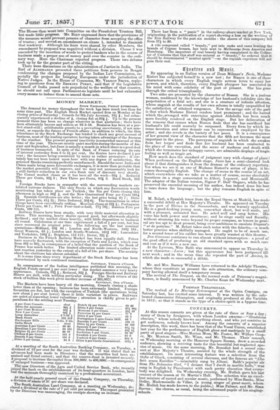Slitstres MO RI mar.
By appearing in an Italian version of Dean Milian's Fazio, Madame Ristori has subjected herself to a new test; for Bianca is one of those characters in which every English tragic actress loves to essay her powers, and which, therefore, every English playgoer has associated in his mind with some celebrity of the past or present. She has gone through the ordeal triumphantly. Two aides are presented by the character of Bianca. She is a jealous woman maddened by the knowledge of her husband's infidelity into the perpetration of a fatal act ; and she is a creature of infinite affection, whose anguish at the results of her own scheme is totally unqualified by the satisfaction of attained vengeanoe. Now the savage side of the part is that which Madame Ristori renders least prominent ; and the hatred which tho .wronged wife entertains against Aldaballa has been much more forcibly rendered on the English stage. But her delineation of the remorse that ensues when Bianca finds that alto has sacrificed her husband's life could scarcely be surpassed. Every ferns by which intense devotion and utter despair can Sc expressed is employed by the artist ; and she revels in the variety of her poses. It is a consequence of her general view of the character that the fifth act becomes the most important in the piece. Tho paroxysm of anguish in which she awakes from her torpor and finds that her husband has been conducted to the place of his execution and the scene of madness and death with which she terminates her unhappy career, are admirable displays of tragic feeling as well as tragic art. How much does the standard of judgment vary with change of place ! When performed on the English stage, Fazio has a semi-classical look about it that distinguishes it from the dramas of the ordinary repertory. Yet when we see it as one of Madame Ristori's series of plays it becomes thoroughly English. The change of scone in the course of anact, which everywhere else we take as a matter of course, seems absolutely licentious on a stage consecrated to Alfieri, Legouve, and Montanelli. The adapter of the Italian version, Signor F. Dail' Ongaro, while he has preserved the essential meaning of his author, has indeed done his best to tame down the language ; but the play remains English in spite of M. Belart, a Spanish tenor from the Royal Opera at Madrid, has madly a successful debtit at Her Majesty's Theatre. He appeared on Tuesday in the part of Elvin° in tho Sonnambuta, and was warmly applauded. He is a good-looking young man, somewhat short, but well made, and with a pleasant, animated face. He acted well and sang better. His voice has both power and sweetness.; and he sings easily and fluently, without straining his voice beyond its proper compass, as tenors in general are too apt to do at present, being over-ambitious to emulate Duprez'S "ut de poitrine." M. Belart takes such notes with the falsetto,—a much. better practice when skilfully managed. He ought to be of much use, for a second tenor of his calibre has been greatly wanted at this theatre. .Don Giovanni continues to run almost without interruption : a proof of the good effect of producing an old standard opera with as much care and cost as if it were a new one.
At the Lyceum, Miss Balfo Was announced to appear on Thursday ire a new character—Lucia; but this appearance has been postponed till next week ; and in the mean time she repeated the part of Amine, in which she made so successful a debfit.
Mr. and Mrs. Barney Williams have returned to the Adelphi Theatre, where they constitute at present the solo attraction, the ordinary company having allowed itself a temporary recess. The revival of The Tempest, on the normal scale of Princess's magnificence, is finally announced by Mr. Charles Kean for Wednesday next.
PARISIAN TIMATRIOADI.
The revival of Le Mariage Extravagant at the Opera Comiquta Saturday last, has excited some interest. It was written by the Celebrated chansonnier Desangiers, and originally produced at the Varietes in 1812; SO that it stands as the type of a choice spirit in a bygone time.
CONCERTS.
At this season concerts are given at the rate of three or four a day ;. many of them by foreigners, with whom London swarms—"illustrious obscure," whom nobody knows anything about, and who yet contrive to get audiences, nobody knows how. Among the concerts of a superior description, this week, there has been that of the Vocal Union, established last year for the performance of English glees and madrigals by a small party of good singers—Miss Marian Moss, Mr. Foster, Mr. Wilbye Cooper, Mr. Montem Smith, Mr. Winn, and Mr. Thomas. Their concert, on Wednesday morning at the Hanover Square Rooms, drew a crowded. audience, showing a reviving taste for this beautiful but neglected species of music. On the same morning, Mr. Benedict had a second concert at Her Majesty's Theatre, assisted by the whole strength of the establishment. Its most interesting feature was a selection from the Orfeo of Gluck, consisting of several choruses, and tho famous air "Dhe faro senza Euridice "—inimitably sung by Alboni. Balfe's popular air from 7'he Bohemian Girl, "I dreamt that r dwelt in marble halls," was sung in English by Piecolornini with such pretty elocution that everybody was delighted. On Wednesday evening, Mr. Hullah gave his last concert of the season at St. Martin's Hall. 'Vac selection was an excellent mixture of sacred and secular music, performed by Miss Banks, Miss Dolby Mademoiselle de Villas, (a young singer of great merit, whom Mr. liullah has made known to the public,) Mies Palmer, and Mr. Sims Beeves; the chorus, as usual, being the advanced pupils of his singingschools.


























 Previous page
Previous page